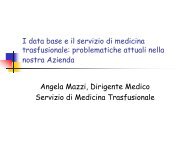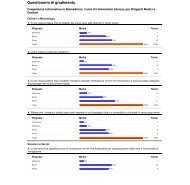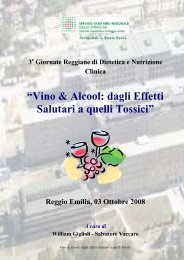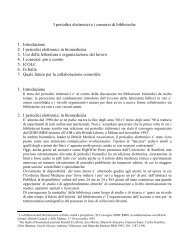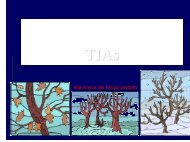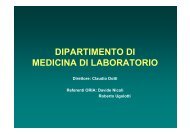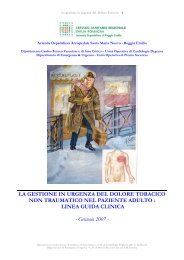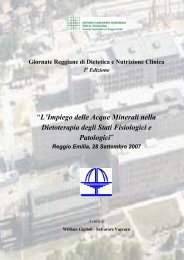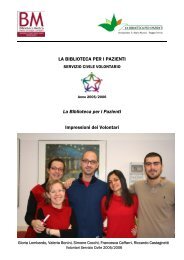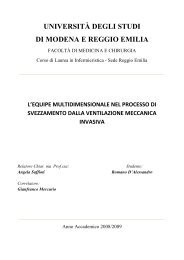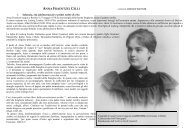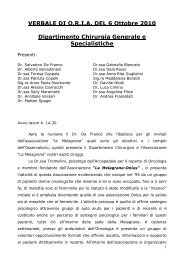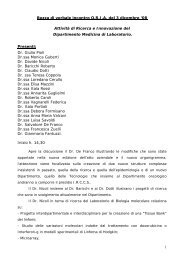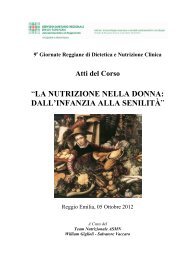Valutare il grado di comprensione delle information literacy skills da ...
Valutare il grado di comprensione delle information literacy skills da ...
Valutare il grado di comprensione delle information literacy skills da ...
You also want an ePaper? Increase the reach of your titles
YUMPU automatically turns print PDFs into web optimized ePapers that Google loves.
informazioni sul progetto ENIL si ve<strong>da</strong><br />
Information <strong>literacy</strong> in Europe. A first insight<br />
into the state of the art of <strong>information</strong><br />
<strong>literacy</strong> in the European Union, a<br />
cura <strong>di</strong> Carla Bas<strong>il</strong>i, Roma, Consiglio nazionale<br />
<strong>delle</strong> ricerche, 2003.<br />
10 SABRINA PICCININI, Information <strong>literacy</strong><br />
sk<strong>il</strong>ls: a case study of student perceptions<br />
at the University of Lugano,<br />
tesi <strong>di</strong> master, University of Northumbria<br />
at Newcastle e Università degli<br />
stu<strong>di</strong> <strong>di</strong> Parma, giugno 2005.<br />
11 Per una definizione <strong>di</strong> ricerca qualitativa<br />
e quantitativa si ve<strong>da</strong>no BEVERLY<br />
HANCOCK, Trent focus for research and<br />
development in primary health<br />
care: an introduction to qualitative<br />
research, Trent Focus, 1998, <br />
(ultima consultazione: 23 gennaio 2006);<br />
MATTHEW B. MILES – MICHAEL HUBER-<br />
MAN, Qualitative <strong>da</strong>ta analysis: an expanded<br />
source, Thousand Oaks, Sage,<br />
1994 2 .<br />
12 “The case study is the method of<br />
choice when the phenomenon under<br />
study is not read<strong>il</strong>y <strong>di</strong>stinguishable<br />
from its context” (ROBERT K. YIN, Applications<br />
of case study research,<br />
Thousand Oaks, Sage, 1993, p. 3). Per<br />
una definizione <strong>di</strong> caso <strong>di</strong> stu<strong>di</strong>o si<br />
ve<strong>da</strong>no anche JACQUES HAMEL, Case<br />
study methods, Thousand Oaks, Sage,<br />
1993; ROBERT E. STAKE, Case stu<strong>di</strong>es, in<br />
Strategies of qualitative inquiry, Norman<br />
E. Denzin and Yvonna S. Lincoln<br />
(eds), Thousand Oaks, Sage, 2003 2 ,<br />
p. 134-164.<br />
13 Si ve<strong>da</strong> a questo proposito: MAT-<br />
THEW B. MILES – MICHAEL HUBERMAN, Qualitative<br />
<strong>da</strong>ta analysis: an expanded<br />
source, cit., p. 267.<br />
14 Per una panoramica sulle problematiche<br />
relative alle interviste in<strong>di</strong>viduali<br />
si ve<strong>da</strong>no BRUCE L. BERG, Qualitative<br />
research methods for the social<br />
sciences, Boston, Allyn and Bacon,<br />
1998 3 ; STEINAR KVALE, Interviews: an<br />
introduction to qualitative research<br />
interviewing, Thousand Oaks, Sage,<br />
1996.<br />
15 “ … in which some participants<br />
withhold things that they might say in<br />
private, and a tendency toward ‘polarization’,<br />
in which some participants<br />
express more extreme views in a<br />
group than in private” (DAVID L. MOR-<br />
GAN, Focus groups as qualitative research,<br />
Thousand Oaks, Sage, 1997 2 ,<br />
Biblioteche oggi – apr<strong>il</strong>e 2006<br />
p. 15); per una trattazione della tecnica<br />
dell’intervista <strong>di</strong> gruppo si ve<strong>da</strong> anche<br />
<strong>il</strong> capitolo Focus group interviewing,<br />
in Qualitative research methods<br />
for the social sciences, cit., p. 100-119.<br />
Un’interessante riflessione sull’uso<br />
dell’intervista <strong>di</strong> gruppo con studenti<br />
universitari si trova nel contributo <strong>di</strong><br />
BARBARA VALENTINE, Undergraduate research<br />
behaviour: using focus groups<br />
to generate theory, “Research in Higher<br />
Education”, 40 (1993), 2, p. 185-200.<br />
16 Le problematiche relative all’uso dei<br />
questionari sono ben evidenziate negli<br />
stu<strong>di</strong> <strong>di</strong> WILLIAM FODDY, Constructing<br />
questions for interview and questionnaires:<br />
theory and practice in social<br />
research, Cambridge, Cambridge<br />
University Press, 1993; NORMAN M.<br />
BRADBURN – SEYMOUR SUDMAN – BRIAN<br />
WASINK, Asking questions: the definitive<br />
guide to questionnaire design – for<br />
market research, political polls, and<br />
social and health questionnaires,<br />
revised e<strong>di</strong>tion, San Francisco, Jossey-<br />
Bass, 2004.<br />
17 Nel prendere la decisione <strong>di</strong> ut<strong>il</strong>izzare<br />
un modello <strong>di</strong> <strong>information</strong> <strong>literacy</strong><br />
sk<strong>il</strong>l è stato <strong>di</strong> conforto l’esempio<br />
tratto <strong>da</strong>lle esperienze fatte <strong>da</strong> altri ricercatori.<br />
Come sostiene Ruth Ivey,<br />
fon<strong>da</strong>mentalmente <strong>il</strong> modello rappresenta<br />
una pratica lista <strong>di</strong> “attributes<br />
Abstract<br />
Casi <strong>di</strong> stu<strong>di</strong>o<br />
and behaviours that could be used to<br />
gather <strong>information</strong> from interviewes”<br />
(RUTH IVEY, Information <strong>literacy</strong>…,<br />
cit.). Si ve<strong>da</strong>no anche gli stu<strong>di</strong> già citati<br />
<strong>di</strong> Hartmann e Johnston; Morrison;<br />
Seamans.<br />
18 Il modello proposto originariamente<br />
è quello suggerito in CHRISTINA<br />
DOYLE, Information <strong>literacy</strong> in an <strong>information</strong><br />
society …, cit.<br />
19 Il modello è tratto <strong>da</strong>lle in<strong>di</strong>cazioni<br />
fornite nel rapporto dell’American<br />
Library Association citato nella nota 2.<br />
20 Il manuale <strong>di</strong> MILES – HUBERMAN,<br />
Qualitative <strong>da</strong>ta analysis: an expanded<br />
source, cit., è indubbiamente un valido<br />
strumento per apprendere i fon<strong>da</strong>menti<br />
dell’analisi qualitativa, anche se<br />
è piuttosto ricco e articolato. Si ve<strong>da</strong>no<br />
anche i contributi più snelli <strong>di</strong><br />
BEVERLEY HANCOCK, Trent focus for research<br />
and development in primary<br />
health care …, cit. e <strong>di</strong> CATHERINE POPE<br />
– SUE ZIEBLAND – NICHOLAS MAYS, Analysing<br />
qualitative <strong>da</strong>ta, “British Me<strong>di</strong>cal<br />
Journal”, 320 (2000), p. 114-116.<br />
21 Pratici consigli sugli elementi chiave<br />
ut<strong>il</strong>i a garantire la vali<strong>di</strong>tà <strong>di</strong> una ricerca<br />
sono raccolti nel capitolo Making<br />
good sense: drawing and verifying<br />
conclusions, in MILES – HUBERMAN,<br />
Qualitative <strong>da</strong>ta analysis: an expanded<br />
source, cit., p. 245-287.<br />
Assessing student perceptions of <strong>information</strong> <strong>literacy</strong> sk<strong>il</strong>ls:<br />
some reflections on the research techniques<br />
Information <strong>literacy</strong> sk<strong>il</strong>ls (ILS) are nowa<strong>da</strong>ys considered to be crucial<br />
ab<strong>il</strong>ities in order to tackle a wide range of activities, particularly in the<br />
academic context. Literature in<strong>di</strong>cates that assessing student perceptions<br />
of ILS is a good practice in order to design ILS implementation at the<br />
university.<br />
At the University of Lugano a case study was carried out with the view to<br />
evaluating students’ understan<strong>di</strong>ng of ILS and of their importance. The<br />
project also examined student perceptions of the role of the library in the<br />
development of ILS and the impact of an ILS course.<br />
This article focuses on the research techniques employed in the project<br />
with the aim to explore methodological choices and point out issues<br />
experienced in <strong>da</strong>ta collection and analysis. Such investigation endeavours<br />
to produce some insights into the use of qualitative research methods and<br />
to provide suggestions to librarians who intend to ut<strong>il</strong>ize such methods in<br />
their work.<br />
The article underlines the importance for the academic library to use<br />
research methods as a means to better understand the university context<br />
and, consequently, to devise strategies to improve library services and to<br />
enhance library visib<strong>il</strong>ity and potentials.<br />
25



